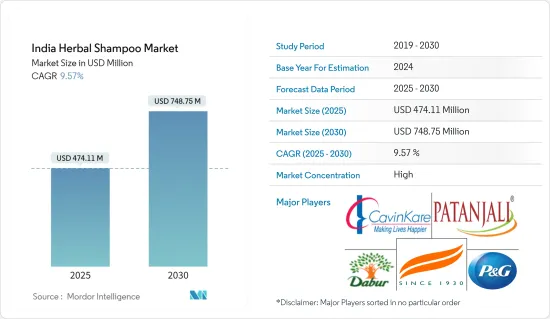PUBLISHER: Mordor Intelligence | PRODUCT CODE: 1690801

PUBLISHER: Mordor Intelligence | PRODUCT CODE: 1690801
India Herbal Shampoo - Market Share Analysis, Industry Trends & Statistics, Growth Forecasts (2025 - 2030)
The India Herbal Shampoo Market size is estimated at USD 474.11 million in 2025, and is expected to reach USD 748.75 million by 2030, at a CAGR of 9.57% during the forecast period (2025-2030).

Consumers prefer herbal products as Ayurveda and traditional herbal remedies are integral to Indian culture. Moreover, there is a growing trend toward shampoos that address specific hair concerns, such as color-treated hair, frizz control, and thinning hair. Herbal shampoos targeting these niche needs are becoming more prevalent. While affordability remains important, a segment of consumers is willing to pay a premium for high-quality, luxury herbal shampoos. These products often come with added benefits like exotic ingredients or specialized hair treatments. Manufacturers also respond to this trend by launching premium products. For instance, in May 2023, CavinKare introduced a 'Nyle Natural and Pure' range of no-sulphate hair care products under its Nyle brand. The new range featured formulations combining ingredients to provide consumers with an enhanced experience, efficacy, and value. The launched range included shampoos, conditioners, and other products, and the company positioned the new range as a premium hair care brand. Moreover, the growing adoption of online shopping among customers increases the sale of herbal shampoos through e-commerce channels. Hence, it expects to gain prominence in the market during the forecast period.
India Herbal Shampoo Market Trends
Inclination Toward Personal Care Products with Natural Ingredients
- The rising beauty and hygiene consciousness among individuals is complementing the growth of the Indian personal care industry. E-commerce penetration is another significant factor behind the escalating demand for personal care products, such as herbal shampoo. A survey by Nykaa, a leading Indian e-commerce company, shows that in 2022, about 27 million orders were placed via its website for beauty and personal care products. The increase in orders was almost ten times as compared to the previous year.
- Exposure to certain chemical ingredients, including antimicrobial agents, surfactants, and preservatives, generally found in synthetic shampoos, can impair hair health. Therefore, consumers are shifting to herbal formulations as a safer alternative. In line with this, brands are making constant efforts through advertisements, promotions, and product demonstrations to spread awareness among consumers about the benefits of herbal extracts in shampoos.
- For instance, in January 2022, WOW Skin Science, a prominent personal care brand, urged people to shift to natural products with its latest campaign featuring Disha Patani-#AbNatureKiSuno. The campaign aims to educate and encourage consumers to give up harsh chemical-based products and instead use herbal products.
Convenience Stores Segment Dominates the Market
- The convenience stores segment is the most preferred distribution channel for herbal shampoo in India. Independent small groceries and convenience stores dominate the Indian retail industry. Additionally, convenience stores have a higher penetration compared to modern retail stores. The penetration rate of convenience store shoppers provides a platform for companies manufacturing herbal shampoos to reach a broader consumer base through attractive promotional strategies for retailers. Such factors have increased the sales of herbal shampoos across the country.
- Moreover, convenience stores have become essential retail outlets in semi-urban and rural areas where supermarkets and hypermarkets are less prevalent. As these stores are operational for longer hours than traditional stores, it is convenient for customers to procure the product quickly.
- Furthermore, the penetration rate of convenience stores provides a platform for manufacturing companies to reach a broader customer base with an extensive product portfolio. For instance, in 2022, Medimix, a brand under the AVA Group, introduced a new herbal shampoo, highlighting its natural ingredients. These initiatives have notably boosted the overall sales value of herbal shampoos in India.
India Herbal Shampoo Industry Overview
As per analysis, the Indian herbal shampoo market is concentrated and dominated by domestic brands and players. Some of the major players in the Indian herbal shampoo market include Dabur, CavinKare, Patanjali Ayurved, Himalaya Wellness, and Procter & Gamble Co. With partnerships and a focus on distribution expansion strategies, players are consolidating their positions in the market. They also emphasize launching novel and innovative products, such as a professional and premium range of herbal shampoos, to retain their customer base and maintain a strong foothold in the market.
Additional Benefits:
- The market estimate (ME) sheet in Excel format
- 3 months of analyst support
TABLE OF CONTENTS
1 INTRODUCTION
- 1.1 Study Assumptions and Market Definitions
- 1.2 Scope of the Study
2 RESEARCH METHODOLOGY
3 EXECUTIVE SUMMARY
4 MARKET DYNAMICS
- 4.1 Market Drivers
- 4.1.1 Inclination Towards Personal Care Products with Natural Ingredients
- 4.1.2 Innovations in Product Development by Manufacturers
- 4.2 Market Restraints
- 4.2.1 Presence of Counterfeit Products And Regulatory Loopholes
- 4.3 Porter's Five Forces Analysis
- 4.3.1 Threat of New Entrants
- 4.3.2 Bargaining Power of Buyers/Consumers
- 4.3.3 Bargaining Power of Suppliers
- 4.3.4 Threat of Substitute Products
- 4.3.5 Intensity of Competitive Rivalry
5 MARKET SEGMENTATION
- 5.1 Distribution Channel
- 5.1.1 Supermarkets/Hypermarkets
- 5.1.2 Convenience Stores
- 5.1.3 Specialty Stores
- 5.1.4 Online Stores
- 5.1.5 Other Distribution Channels
6 COMPETITIVE LANDSCAPE
- 6.1 Most Adopted Strategies
- 6.2 Market Share Analysis
- 6.3 Company Profiles
- 6.3.1 Dabur India Ltd.
- 6.3.2 Himalaya Global Holdings Ltd
- 6.3.3 Unilever PLC
- 6.3.4 Fit & Glow Healthcare Pvt. Ltd.
- 6.3.5 The Procter & Gamble Company
- 6.3.6 Khadi Natural
- 6.3.7 Patanjali Ayurved Limited
- 6.3.8 Cavinkare Pvt. Ltd.
- 6.3.9 Lotus Herbals Pvt. Ltd.
- 6.3.10 Bio Veda Action Research Co.
7 MARKET OPPORTUNITIES AND FUTURE TRENDS




